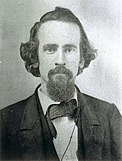Selected biography 1
Portal:Writing/Selected biography/1
W. Andrew Robinson (born 1957) is a British author[1][2] and former newspaper editor.[3]Andrew Robinson was educated at the Dragon School, Eton College where he was a King's Scholar, University College, Oxford where he read Chemistry and finally the School of Oriental and African Studies in London. He is the son of Neville Robinson, an Oxford physicist. He is based in London and is currently a full-time writer.
Robinson has written several books about the history of writing, including:
- The Story of Writing: Alphabets, Hieroglyphs and Pictograms. Thames and Hudson (2000). ISBN 0-500-28156-4.[4]
- Lost Languages: The Enigma of the World's Great Undeciphered Scripts. McGraw-Hill (2002). ISBN 0-07-135743-2.[5][6]
- Writing and Script. Oxford University Press (2009). ISBN 9780199567782.[3][7][8] (Full article...)
Selected biography 2
Portal:Writing/Selected biography/2
Denise Schmandt-Besserat (born August 10, 1933) is a French-American archaeologist and retired professor of art and archaeology of the ancient Near East.Schmandt-Besserat has worked on the origin of writing and counting, and the nature of information management systems in oral societies. Her publications on these subjects include:
- Before Writing (2 vols), University of Texas Press 1992;
- How Writing Came About, University of Texas Press 1996;
- The History of Counting, Morrow Jr. 1999;
- When Writing Met Art (University of Texas Press, 2007); and
- numerous articles in major scholarly and popular journals among them Science, Scientific American, Archaeology, American Journal of Archaeology, and Archaeology Odyssey.
Her work has been widely reported in the public media (Scientific American, Time, Life, New York Times, The Washington Post, Los Angeles Times, Christian Science Monitor.) She was featured in several television programs such as Out of the Past (Discovery Channel), Discover (Disney Channel); The Nature of Things (CBC), Search for Solutions (PBS), and Tell the Truth (NBC).
In her most recent book, When Writing Met Art (2007), Schmandt-Besserat investigated the impact of literacy on visual art. She showed that, before writing, art of the ancient Near East mostly consisted of repetitive motifs. But, after writing, conventions of the Mesopotamian script, such as the semantic use of form, size, order and placement of signs on a tablet was applied to images resulting in complex visual narratives. She also shows how, reciprocally, art played a crucial role in the evolution of writing from a mere accounting system to literature when funerary and votive inscriptions started to be featured on art monuments. (Full article...)
Selected biography 3
Portal:Writing/Selected biography/3 Rudolf Koch (November 20, 1876 - April 9, 1934) was a leading German calligrapher, typographic artist and teacher, born in Nuremberg. He was primarily a calligrapher with the Gebr. Klingspor foundry. He created several fonts, both in fraktur and normal formats. Fritz Kredel studied under Koch.
Koch wrote a book of 493 old-world symbols, monograms and runes entitled The Book of Signs which was published in 1955 by Dover Publications, INC. and which belongs to the Dover Pictorial Archive Series.
Some of Koch's work can be seen today at the Klingspor Museum in Offenbach.
Some typefaces developed by Koch include:
- Neuland (1923)
- Kabel (1927)
- Zeppelin (1929)
- Prisma (1931)
- Holla (1932)
- Marathon (1938) (Full article...)
Selected biography 4
Portal:Writing/Selected biography/4
Henry George (September 2, 1839 – October 29, 1897) was an American writer, politician and political economist, who was the most influential proponent of the land value tax, also known as the "single tax" on land. He inspired the economic philosophy known as Georgism, whose main tenet is that people should own what they create, but that everything found in nature, most importantly land, belongs equally to all humanity. His most famous work, Progress and Poverty (1879), is a treatise on inequality, the cyclic nature of industrial economies, and the use of the land value tax as a possible remedy.Henry George is best known for his argument that the economic rent of land should be shared by society rather than being owned privately. The clearest statement of this view is found in Progress and Poverty: "We must make land common property." By taxing land values, society could recapture the value of its common inheritance, and eliminate the need for taxes on productive activity. (Full article...)
Selected biography 5
Selected biography 6
Selected biography 7
Selected biography 8
Selected biography 9
Selected biography 10
- ^ Andrew Robinson (1), LibraryThing.
- ^ Books by Andrew Robinson, Alibris.
- ^ a b Mark Twaite, Interview with Andrew Robinson, The Book Depository, 2009.
- ^ Andrew Robinson, Andrew Robinson on the story of writing. The Times, 29 September 2007.
- ^ James McConnachie, Lost Languages: The Enigma of the World's Undeciphered Scripts by Andrew Robinson. The Sunday Times, 8 March 2009.
- ^ Andrew Robinson, Decoding antiquity: Eight scripts that still can't be read. New Scientist, 27 May 2009.
- ^ Steven Poole, Writing and Script by Andrew Robinson. The Guardian, 19 September 2009.
- ^ Greg Neale, "Book reviews: Writing and Script". Oxford Today, 22(2):37, 2010.


